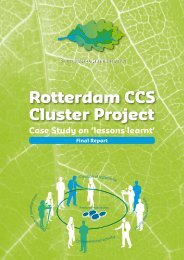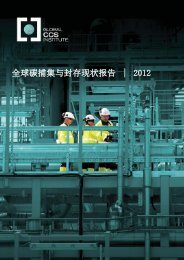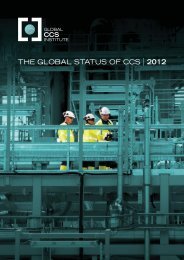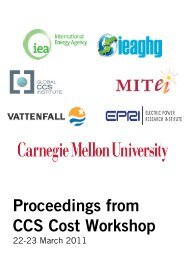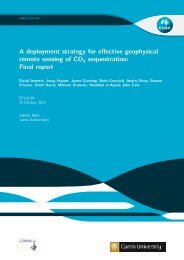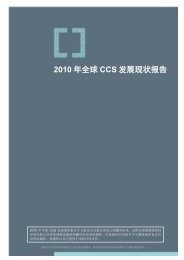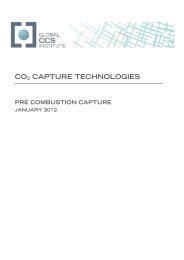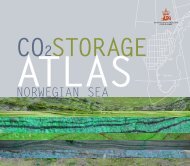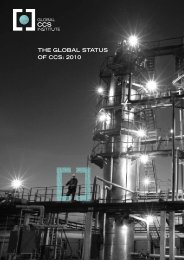Perceptions of CO2 Report - Global CCS Institute
Perceptions of CO2 Report - Global CCS Institute
Perceptions of CO2 Report - Global CCS Institute
- No tags were found...
You also want an ePaper? Increase the reach of your titles
YUMPU automatically turns print PDFs into web optimized ePapers that Google loves.
9.2.5 NEED FOR CARE IN ADDRESSING CO 2 ’S BEHAVIOUR IN <strong>CCS</strong>The effects <strong>of</strong> the information on CO 2 behaviour in <strong>CCS</strong> were mixed between positive andnegative, and sometimes cancelled each other out. For instance, the information on “CO 2characteristics” was shown to mitigate the negative impact on this scale caused by the information“CO 2 natural phenomena.” It is important to convey the correct information on CO 2 characteristicsbecause the understanding <strong>of</strong> CO 2 characteristics could mitigate misunderstandings that arisewhen respondents receive any incomplete or indirect information about <strong>CCS</strong>.9.2.6 NEED FOR ADDITIONAL BASIC INFORMATION ON CLIMATE CHANGE, <strong>CCS</strong> ANDTHEIR RELATIONSHIP TO CO 2 EMISSIONSUnderstanding <strong>of</strong> the effectiveness <strong>of</strong> <strong>CCS</strong> as global warming reduction measure was one <strong>of</strong> thestrongest positive factors that influenced the <strong>CCS</strong> impressions “Positive”, “Clean”, and “Useful.”This suggests that respondents should receive more background information about <strong>CCS</strong> and itsrole as a climate change mitigation technology in order to form an opinion about <strong>CCS</strong>. This studyalso demonstrated a significant gap between “awareness” and “knowledge,” similarly to what hasbeen previously shown by Ashworth, Beath, Boughen, & Littleboy (2005). Results show thatawareness does not directly imply knowledge, as in all three cultural settings approximately onequarter <strong>of</strong> respondents indicated having heard about <strong>CCS</strong>, but not really knowing what it was. Thisknowledge-awareness gap poses an issue for communicating about <strong>CCS</strong>, as the results alsodemonstrate that knowledge about <strong>CCS</strong> plays a key role in forming people’s opinions about thetechnology: mere awareness would seemingly lead to a different opinion than knowledge. Thisresult highlights the importance <strong>of</strong> education and the provision <strong>of</strong> reliable and balanced informationin <strong>CCS</strong> communication strategies.9.2.7 NEED FOR ADDITIONAL <strong>CCS</strong> EDUCATION AND OUTREACH CAMPAIGNS THROUGHLESS-FORMAL MECHANISMSAnalysis showed a strong relationship between participants’ tendency to believe in the credibility <strong>of</strong>certain information sources and their knowledge <strong>of</strong> <strong>CCS</strong> topics. Trust in friends, websites, andnational and local NGOs was negatively correlated with correct understanding <strong>of</strong> <strong>CCS</strong>. Thesesources may be labelled “less formal” in contrast to public sector organisations, local government,national newspapers, and scientists. The correlation between trust in informal sources and poorerunderstanding <strong>of</strong> <strong>CCS</strong> suggests that the people with the poorest understanding <strong>of</strong> <strong>CCS</strong> may alsobe least likely to trust information and education by government, scientists, and other formalauthorities regarding it. Therefore, sole reliance on the formal information sources (i.e., publicsector organisations, local government, national newspapers, and scientists) may not reach thepeople with the poorest understanding <strong>of</strong> <strong>CCS</strong>. Alternative means should be adopted.Understanding how individuals perceive carbon dioxide | 51




